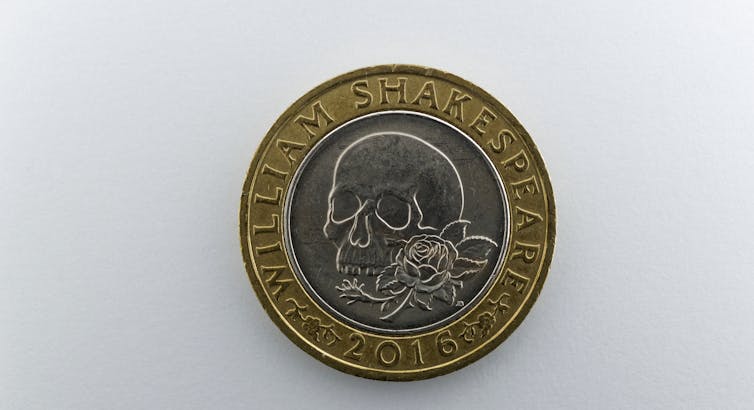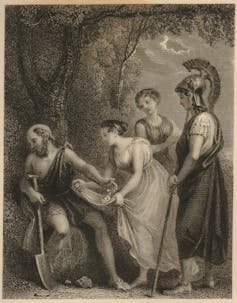
Paul Yachnin, McGill University
In his Economic and Philosophic Manuscripts of 1844, Karl Marx used Shakespeare’s work to examine money and its impact. The text was Timon of Athens, a tragedy written by Shakespeare and Thomas Middleton.
“Shakespeare,” Marx said, “excellently depicts the real nature of money.” Marx thought Timon of Athens shows perfectly how money both funds the miraculous fulfilment of all our wishes — and also robs us of friendship, love and our very humanity.
As philosopher Margherita Pascucci as well as the editors of the Arden Shakespeare third edition of Timon of Athens argue, Marx gets a great deal right about money in the play. I think that the play’s case against money is even more sinister than Marx does, but also, that the play shows how money can be used for the public good.
Spreading the wealth
Super-rich Timon loves to spread his wealth around. His supposed friends give him gifts in expectation of returns on investment. “If I want gold,” says one senator, “steal but a beggar’s dog / And give it Timon, why, the dog coins gold.”
Timon thinks money is simply the thing he and his “friends” use to celebrate their friendship. “O,” Timon tells his greedy guests, “what a precious comfort ‘tis to have so many like brothers commanding one another’s fortunes.”
But Marx, like Shakespeare and unlike Timon, finds that money makes us powerful and lovable precisely by alienating us from ourselves. Marx builds his case against money on Timon’s diatribe against gold, which comes pouring out of him when all his “brothers” deny him money when he is most in need.
For Timon, gold is revealed as a “visible god” with the power to make the ugly beautiful, the evil good and able to conjure what passes for love between people. Timon comes to understand how money replaces human relations with monetary ones.
Written in plague-time
In 1605-6, when the play was likely written, Middleton was coming off a string of brilliant satires about money-grubbing and seeking status. Shakespeare had, over the previous few years, written his great tragedies, including Othello, King Lear and Macbeth. In these early years of the reign of King James, the royal court was a hotbed of self-display by courtiers on the make and self-promoting gift-giving.
The plague had also swept through England in 1603, when about 25 per cent of the population of London died. Plague struck again in 1606, which is why the play seems never to have been performed in Shakespeare’s lifetime.
The London playhouses were ordered closed. The churches, however, stayed open; congregants could hear about how plague came from God as a punishment for their sins.
Money as disease
Against this background of courtly profligacy and plague, it should come as no surprise that money in Timon of Athens isn’t merely an instrument of both empowerment and alienation. Money is a disease whose serpent-like winding from person to person swells into a pandemic large enough to annihilate humankind.
When Timon storms out of Athens, he curses the city:
at their society, as their friendship, may
Be merely poison!”
Alone in the woods, he digs for roots, but finds instead a fortune in gold. He gives gold to the soldier Alcibiades to bankroll an attack on Athens. Alcibiades had been banished from the city by the arrogant, unjust senators. Timon encourages him to slaughter everyone, down to the babies with “dimpled smiles”:
“Put up thy gold: go on — here’s gold — go on;.
Be as a planetary plague, when Jove
Will o'er some high-viced city hang his poison
In the sick air …”
Sharing money

We moderns are informed by scientists, but we would do well to think with these Renaissance playwrights about about how the desire for money, and the power and pre-eminence money can buy, has led us to exploit the natural world and create gross global disparities in wealth.
Might money itself might have helpful or healing properties in the face of both the inequities that have become apparent during the COVID-19 pandemic and the planetary climate crisis?
The play suggests two ways money can save us. Near the play’s end, Timon’s steward Flavius and his former servants gather to say farewell. Flavius makes the other men take a share of the money he has saved through his employment. “Nay, put out all your hands,” he says, “not one word more.”
What we see is a group of people whose hunger and desire for shelter are addressed by the simple sharing of money — as Marx wrote (or at least popularized), to each according to his needs.
Surely today, less hoarding of wealth and fairer systemic distribution of resources could help mitigate some of the worst impacts of the virus on communities that have been hardest hit. Similarly so when we look at the disproportionate impacts of climate change on the Global South.
Money upholding law
The play also shows us how money might help to uphold the law and undo corruption.
With Timon’s gold, Alcibiades is able to bring an army to the gates of Athens. Instead of putting the city to the sword, he uses the threat of the sword to enforce the good laws of Athens and to purge the corruption of the Athenian senators, who “with all licentious measure,” make their “wills / The scope of justice.” Alcibiades honours “the stream / Of regular justice … and public laws.”
We can put aside the spectre of righteous armies at the gates of our cities. Violence cannot create a just world. But money could serve to give the law teeth. Money could fund a lawful path toward a just world.
Imagine how we might scale up from Alcibiades’ honouring of “the stream of regular justice.” Money could fund a transnational movement able to transform into law in every nation a document like the Paris climate agreement, a pact which even the signatory governments now can simply nod at and ignore.
Groups championing a better Earth show us some ways it can be done. To make the Paris agreement into law across all nations would be to turn the world and the “visible god” of money toward what really matters and to give humankind a fighting chance of survival.
As Shakespeare understood, our fate depends on our ability to foster the humility and fellow feeling that will dethrone our god of money and transform it into a thing we use to advance our good and the good of others.
Paul Yachnin, Tomlinson Professor of Shakespeare Studies, McGill University
This article is republished from The Conversation under a Creative Commons license. Read the original article.

